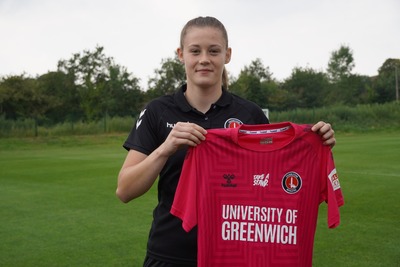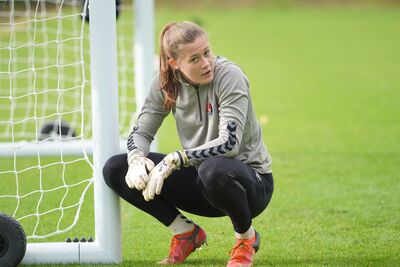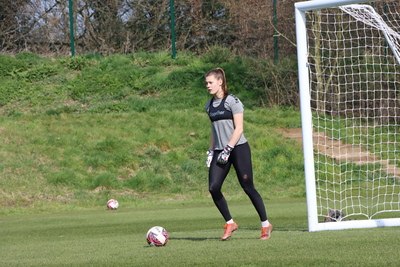We've heard from a growing number of people who suffer from Post Orthostatic Tachycardia Syndrome (POTS) in recent years as they've mentioned that our PH 1500 electrolytes have helped them reduce the hydration-related side effects of the condition.
Professional footballer Sophie Hillyerd recently reached out to say that the 1500s have helped her get back to performing at her best. So, we sat down with the London City Lionesses goalkeeper to find out how she's battling back from a bleak prognosis and getting her career back on track...
Hi Sophie, can you tell us how you found out you had POTS and what effect that had on your future as a pro athlete?
Shortly after I joined Charlton Athletic in 2021, a few of the girls went down with Covid and, despite not testing positive, I had symptoms too. I went through the isolation period but found I was really breathless when I returned to training, which I guess was to be expected, but my fitness continued to get worse.
My breathing was rapid, my legs were heavy, it just felt like I was unfit! The medical team noticed that my heart rate was through the roof and wouldn't go down.
In the space of two months, I underwent several tests on my heart and lungs but they all came back normal - bar the fact my HR remained sky high. Over this period, I started to develop new symptoms such as severe chest pain, light headedness when standing, headaches and discolouration in my legs.

By the end of October, the decision was made to completely pull me out of training. The team doctor did a lot of reading and thought I might have something called POTS.
After two months of waiting, I took the diagnostic ‘tilt’ test on 16th December and it came back positive, which was when I was given the devastating news that it was unlikely that I'd play again this season.
How big an impact has the condition had on your ability to perform at your best?
It’s had a huge impact on my life. There was a point at which I was told I need to think about my future as football might not be an option anymore. That was crazy to me, football has been my life ever since I can remember. I've poured my heart and soul into it, not playing has never been an option.
I'd worked so hard to get to my first year as a professional footballer and it was a possibility that it could be over before it even started. I didn't want to believe it but for months I was unable to do anything; I'd sit on the sofa all day whilst my teammates were training, it was heart-breaking.

I'm so thankful that I’m back playing now, but it’s taken me a while to get back into the swing of things and I’ve found different ways of adapting so that I can still perform.
Great to hear you're back training. So, how have you managed your symptoms in order to be able to train effectively?
There isn't too much guidance or advice for athletes living with POTS, so it actually took a while to figure out the best way for me to move forwards.
When I train, I wear compression tights which essentially help my body bring the blood and therefore oxygen back to my heart and brain by compressing my lower limbs. I also take medication three times a day which increases my blood pressure and helps my blood flow.
Probably the most important thing I’ve done is increase my sodium intake. I knew for a while that increasing salt intake was supposed to help people with POTS, so I tried adding more salt to my foods but there's only so much you can really add. It wasn’t until I saw a specialist at the end of January that I realised how much more I needed. They actually recommended Precision Fuel & Hydration. It wasn’t until I tried the electrolytes that I realised how much difference they made; it was like night and day.
I take two PH 1500 tablets in a litre of water the morning before I train. I then have another two when I'm training. And then post-training, I usually have another two tablets to last me through lunch and gym. Sometimes when the weather is warm, I’ll use even more! It’s been essential due to the intensity I train at.

My life outside of football changed a little bit but it's definitely improving week by week. It's a lot harder to remember all of the things I need to take and do when I'm not in a set routine like I am at football.
For example, if I've not taken enough salt and I go to the supermarket, I literally overheat standing in the queue and feel like I’m going to pass out so I end up leaving. I also have to allow myself breaks when I’m doing certain tasks; I don't know what it is about changing the bed sheets but it absolutely kills me!
What would be your best piece of advice for anyone with POTS who’s looking to exercise regularly?
Firstly, I’d 100% recommend exercise to anyone who has POTS, not only because it releases serotonin but also because some studies have found that it actually can reduce symptoms in the long run.

My advice would be just don't give up because you will get there. For me it took time to figure out what works best for me, particularly when it comes to using strong electrolytes. I went through so many hard days, days where I’d think I was getting better and be able to train again, but then I’d feel so poorly and be straight back in bed. It’s just a case of finding what works for you.